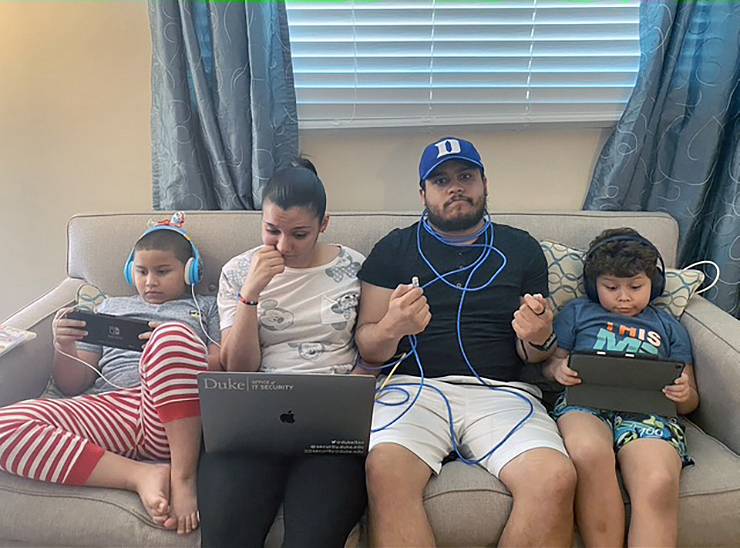Keeping Kids Safe Online During COVID-19
As the pandemic leads more children to online learning, cybersecurity remains crucial

As a vulnerability management analyst with Duke’s Information Technology Security Office, Niko Bailey knows plenty about the threats that exist in the online environment. And as the father of two boys who are taking their first steps into cyberspace with local schools closed, he understands the role parents play in keeping children safe.
With COVID-19 forcing young students to learn online, opening up more time on Internet-connected devices, the need to understand how to keep kids safe is paramount.
“It’s a unique time,” Bailey said. “It brings a lot of the issues that you’ve known about to the forefront. Normally, you worry about your kids playing, gaming and watching videos. But now, it seems like it’s more important because we’re not just worried about them online playing games, we’re worried about them online during class for educational reasons. You want to make sure they’re getting the right resources and appropriate access but you also want to make sure they’re safe.”
Bailey and his Information Technology Security Office colleagues Cara Bonnett and Anthony Miracle led a workshop last week entitled “Learning and Working Securely from Home: Tips for Families and Children.” The group will offer the webinar again at 10 a.m. Friday, April 24.
Here are a few of the ways you can navigate an online environment with your children.
Even Kids' Passwords Matter
When Bailey’s sons, 8-year old Dominik and 6-year old Xander, began learning online while staying home from school as a result of COVID-19, they were signed up for various online learning resources through their school. In some cases, they had accounts set up by teachers, complete with previously created passwords.
One of the first things Bailey recommends, if possible, is changing passwords to something more complex. Duke’s Information Technology Security Office has advice on creating strong passwords.
While it may seem like hackers won’t target children or that online learning websites can seem harmless, anyone, young or old, can be a target for identity theft, computer viruses or online scams. And by breaching any secure password, hackers get one step closer to accessing secure data.
“Most folks, in their busy world, and I understand it, they don’t always have the time to put security first,” Bailey said. “But when it comes to children, you can’t be too careful.”
Duke students, faculty and staff can increase the security of their passwords for free by using LastPass, a password management service that, when installed on your computer’s Internet browser or your mobile device, will create and store long, strong passwords for all of your online accounts.
Also, be sure anti-virus software is loaded on your computer and up to date. Duke recently partnered with CrowdStrike to pilot an anti-virus solution for protection against malware, ransomware and other threats. Falcon Prevent is available to faculty, staff and students at no charge on personal Windows computers. Learn about other options here.
Keep Everything in the Open
While his two children are grown, John Carbuccia, an IT Analyst for Trinity Technology Services, attended last week’s webinar to know how to answer the online security questions parents in his department occasionally have.
One simple tip passed along by the webinar’s panelists is to make sure that children’s Internet use occurs at a computer in a public part of the house, where adult supervision is close at hand.
Carbuccia points out that at school, children use computers with strict content filters and security settings.
“Now, they’re no longer in school,” Carbuccia said. “They’re at home and those safety measure may not be in place. So you’ve got to be more careful.”
One way Carbuccia combatted this when his children lived at home was by building a large desk near the kitchen, where all computer use took place.
“That was where everyone studied,” Carbuccia said. “We knew what was going on there.”
Build Savvy Users
The Information Technology Security Office experts recommend that you check your devices – phones, tablets and computers – to see what parental controls and web safety features are available. Often those work best since they’re specifically designed for that particular device.
But experts pointed out that, perhaps more important than any technological safeguard, is the simple act of talking to your children about cybersecurity and how to make safe choices when online. By teaching children to be wary of things they encounter online, they can start developing the instincts that can keep them from making costly choices.
Heidi Pongracz, a pediatric physical therapist with Duke Healthy Lifestyles, attended the webinar and said she often talked to her children – who are now 18 and 20 – about being smart internet users.
“Those conversations are important,” Pongracz said. “We’d talk a lot at dinner time about being really, really cautious when you get a pop-up on your screen, or being really careful with your email. We’d ask them to always pause when they’re not sure of something and ask themselves if they should really open it.”
Help us share the proactive and extensive work being done by all Duke community members during the COVID-19 outbreak. Send ideas, shout-outs and photographs with us here or write us at working@duke.edu.